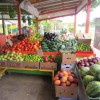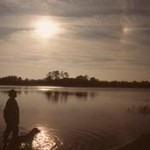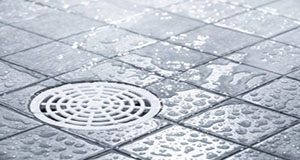Water impacts Florida’s tourism, agriculture, retail, and real estate development industries, all of which significantly contribute to Florida’s economy. Enhancing and protecting water quantity, quality, and supply is of ever-increasing importance to UF/IFAS Extension. This four-page document will provide an overview of how to communicate with Florida residents about water, including information about their preferred communication method and what water-related topics are of interest to Florida residents. Written by Alexa J. Lamm, Phillip Thomas Stokes, and Caroline G. Roper, and published by UF’s Agricultural Education and Communication Department, September 2017.
http://edis.ifas.ufl.edu/wc165
Tag: Caroline G. Roper
Talking Local series
 Extension agents can assist Florida farmers and ranchers in the labeling, sale, and promotion of locally-produced products. This six part series of 3- to 5-page fact sheets provides information about Florida consumers’ perceptions of local food to Extension faculty who are interested in local food programming or who work with local food clientele. Written by Joy N. Rumble and Caroline G. Roper, and published by the UF Department of Agricultural Education and Communication, September 2014.
Extension agents can assist Florida farmers and ranchers in the labeling, sale, and promotion of locally-produced products. This six part series of 3- to 5-page fact sheets provides information about Florida consumers’ perceptions of local food to Extension faculty who are interested in local food programming or who work with local food clientele. Written by Joy N. Rumble and Caroline G. Roper, and published by the UF Department of Agricultural Education and Communication, September 2014.
http://edis.ifas.ufl.edu/topic_series_talking_local
In this series:
- Florida Consumer Definitions of Local Food
- Florida Consumers’ Local Food Purchasing Behaviors
- Florida Consumers’ Reasons for Purchasing Local Food
- Florida Consumers’ Food Buying Decisions when Given Local Food Information
- Florida Consumers’ Flexibility with the Term “Local”
- Florida Consumers’ Fresh from Florida Perceptions
Engaging Consumers in At-Home Water Conservation: A Guide for Extension
 With a growing urban population and increased demands on water for recreational and agricultural purposes, Florida will have to identify a solution to its water quality and quantity issues. Although all Florida residents will play a part in conserving water in the future, the ability of Extension faculty to work with consumers and encourage new water conservation behaviors at home will be vital. This 4-page fact sheet provides information to Extension faculty about the water conservation behaviors in which Florida residents currently engage, water conservation product ownership, and public interest in water-related topics. Written by Caroline G. Roper and Alexa J. Lamm, and published by the UF Department of Agricultural Education and Communication, September 2014.
With a growing urban population and increased demands on water for recreational and agricultural purposes, Florida will have to identify a solution to its water quality and quantity issues. Although all Florida residents will play a part in conserving water in the future, the ability of Extension faculty to work with consumers and encourage new water conservation behaviors at home will be vital. This 4-page fact sheet provides information to Extension faculty about the water conservation behaviors in which Florida residents currently engage, water conservation product ownership, and public interest in water-related topics. Written by Caroline G. Roper and Alexa J. Lamm, and published by the UF Department of Agricultural Education and Communication, September 2014.
http://edis.ifas.ufl.edu/wc169
Extension and the Environment: Understanding Florida Residents' Perceptions of Environmental Water-Related Topics
 By understanding Florida residents’ perceptions of water quality and quantity issues, Extension faculty can better communicate with them about water quantity and quality issues. This 4-page fact sheet explores Florida residents’ perceptions of water topics related to environmental issues. Written by Caroline G. Roper and Alexa J. Lamm, and published by the UF Department of Agricultural Education and Communication, September 2014.
By understanding Florida residents’ perceptions of water quality and quantity issues, Extension faculty can better communicate with them about water quantity and quality issues. This 4-page fact sheet explores Florida residents’ perceptions of water topics related to environmental issues. Written by Caroline G. Roper and Alexa J. Lamm, and published by the UF Department of Agricultural Education and Communication, September 2014.
http://edis.ifas.ufl.edu/wc167
Communicating with Extension Clients about Water
 As the U.S. and Florida populations continue to increase and the demand for fresh, clean water rises, water quality and quantity issues will become increasingly important. Extension faculty should understand public opinion surrounding water issues and identify the information that needs to be communicated to the public about water issues, as well as the best mode for this communication. This EDIS publication will provide an overview of how to communicate with Florida residents about water, including information about their preferred communication method and what topics surrounding water Florida residents find of interest. This publication will better equip Extension faculty to discuss water quantity and quality issues with Florida residents. This 4-page fact sheet was written by Caroline G. Roper and Alexa J. Lamm, and published by the UF Department of Agricultural Education and Communication, June 2014.
As the U.S. and Florida populations continue to increase and the demand for fresh, clean water rises, water quality and quantity issues will become increasingly important. Extension faculty should understand public opinion surrounding water issues and identify the information that needs to be communicated to the public about water issues, as well as the best mode for this communication. This EDIS publication will provide an overview of how to communicate with Florida residents about water, including information about their preferred communication method and what topics surrounding water Florida residents find of interest. This publication will better equip Extension faculty to discuss water quantity and quality issues with Florida residents. This 4-page fact sheet was written by Caroline G. Roper and Alexa J. Lamm, and published by the UF Department of Agricultural Education and Communication, June 2014.
http://edis.ifas.ufl.edu/wc165
